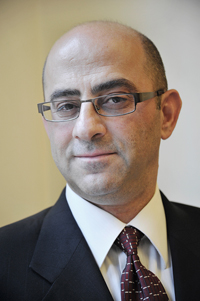
Chris Shiamili, founder of Ardor
Another residential brokerage is getting into the high-commission split game and
as more firms with this model pop up across the city, it’s becoming imperative
that the companies differentiate themselves.
Chris Shiamili, founder of Manhattan-based Ardor New York Real Estate,
launched a new commission model for his firm July 1 and said his firm is distinct
in two ways.
The first is agents’ option every couple of months to switch between three
different commission split models — two offering a 90 percent split on all non-Ardor exclusives and one being the already existing, more traditional, 50-percent split — and the
second, he said, is the amount of back-end support Ardor offers to all of its agents
compared to the other high-split firms.
As for the support, Shiamili pointed to the
spacious 12,000-square-foot office at 1040 Sixth Avenue overlooking
Bryant Park and the 10-member full-time support staff that includes in-house
programmers, listings managers and property photographers.
“What could be revolutionary,” he said, “is that our firm will challenge traditional
ones with better splits, and high-commission firms with better support.”
But why do this now?
Shiamili said he was first inspired to launch the new model when one of his top-producing agents fled for a higher split. “We were slow to adapt,” he said. “The
paradigm shift has accelerated in the past two years; now companies must work
for their agents.”
Firms with high-commission broker splits have appeared with increasing
frequency of late. David Schlamm, founder of City Connections, might have been the first to bring the model to the
city in 2004. Two years later, Paul Purcell and Kathy Braddock left Prudential
Douglas Elliman to launch Rutenberg Realty, which now boasts more than 450 agents
operating under a high-split. For comparison’s sake, The Real Deal reported last July, that Rutenberg’s offices are 1,800 square feet — far smaller than Shiamili’s space.
But the floodgates have opened in 2011 as new kids on the block
try to lure agents from more traditional firms to their companies.
In January, Kevin Kurland launched the Spire Group, and a group of Nest Seekers agents launched BLU Realty
Group. In May, Amnon
Hecht launched Titan Real Estate, and last month Charles Doolan, formerly of Rutenberg,
launched Kian Realty.
Ardor, founded in 1995, currently has 62 agents that do about 70 percent of their
business in rentals, Shiamili said.
Under one of the 90 percent options the agent pays $995 monthly for a
desk, a Naked Apartments account and 15 New York Times
advertisements. Under the other 90 percent commission model, the agent pays
$495 a month to work virtually and get a Naked Apartments account and five
New York Times ads. The third model is a more traditional 50-50 split
— which he already had in place — that includes a Naked Apartments account, unlimited Times ads and discounted Craigslist ads without a desk fee.
All of Ardor’s existing agents chose to stay with the traditional model, to this
point, and Shiamili said his one new hire chose one of the 90-percent
split options. Shiamili envisions the new 90 percent models will
attract “hundreds” of agents to his firm, but said Ardor won’t have “the open-door
policy” — and hire almost anyone who’s interested — which he suspects many other high-split firms have to generate sufficient revenue.
“When you see a firm has two dozen agents paying $400 in fees a month it’s
pretty obvious what the cash flow is like,” Shiamili said. “And you can’t afford much
support with those revenues.”
Shiamili admitted that until he hires enough agents that want the 90-percent
commission split, the firm’s traditional-split brokers would cover the costs of the
support available to all agents.
His competitors were quick to question the viability of his model.
Kurland noted that having many agents operating under different models, and
potentially switching back and forth between them, “could get confusing.” He also
dismissed the notion that Ardor could offer significantly better support because
of its revenue from traditional agents. Spire, he said, has hired 50 agents since
introducing the model in January, bringing the firm’s total head count to 60, and
ensuring a fixed income that can be reinvested into the firm. At Spire, all agents operate under the high-split model.
Hecht also scoffed at Shiamili’s claim of superior support.
“The only ‘best support’ is giving the agents everything,” he said. “And 100
percent commissions, equal access to listings and complete control over
advertising is exactly that.” Moreover, he said that while the choice for different
models is good for industry newcomers, experienced agents don’t need that
choice. “Under the traditional model they are simply underpaid,” he added.
Braddock said the ability of its leaders to manage will ultimately separate those
that become large from those that remain boutique firms.
“You can have a similar financial model — that’s very easy,” she said. “But what’s
behind it? What kind of support? Who is managing and training the agents and
helping them grow their business? What attorney will they use when things go
south? These are the factors that will ultimately make the difference.”